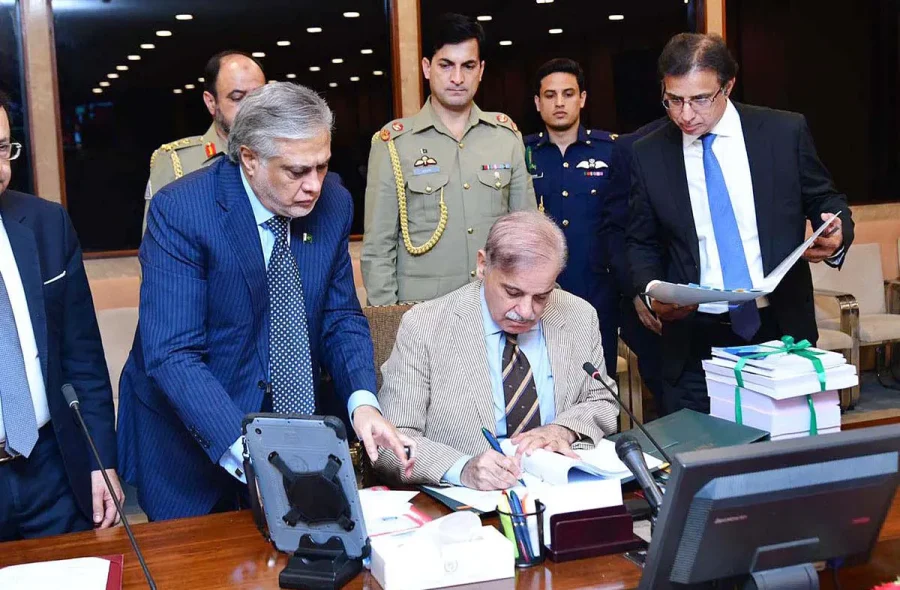Envisages 3.5% growth; No increase in duty on import of essential items; Rs950b allocated for PSDP; Trade deficit has been reduced by $21b; Threat of default averted due to tough decisions; Fall in foreign exchange reserves slowed down; Inflation to ease by 21pc
Finance Minister Ishaq Dar Friday unboxed a Rs14.46 trillion budget for the fiscal year 2023-24, introducing “no new taxes” and envisaging an economic growth of 3.5% as the country looks to persuade the International Monetary Fund to release more bailout money.
Dar, who presented the second budget of the Pakistan Democratic Movement-led government, which came into power in April last year, in the National Assembly and Senate, returned to the podium to announce the federal budget after a hiatus of five years.
At the outset of his budget speech the finance minister recalled that the country was “headed towards” economic prosperity during the Pakistan Muslim League-N’s previous government.

But, he said, a “conspiracy” was hatched against then-prime minister Nawaz Sharif and the Pakistan Tehreek-e-Insaf was “installed” as the country’s ruling party.
Because of the PTI’s “dismal governance” during its nearly four-year tenure, the finance minister said, the country was now facing one of the “worst economic crises”.
FinMin Dar mentioned that despite the tough economic challenges confronting Pakistan due to PTI’s misgovernance, the coalition parties still came into power.
“We took and are still taking tough decisions which rescued the economy from default,” he reiterated — a statement that the incumbent rulers have stressed time and again.
The finance minister mentioned that the country faced numerous internal and external challenges over the last year. Still, the government upped its efforts and tried to provide relief to the people.

Dar mentioned that although the nation suffered massive losses of $30 billion due to unprecedented floods, the government is bidding to resume the IMF programme and take the country on the road of development.
“We have completed all the prerequisites of the ninth IMF review […] we are hoping to reach an agreement with the IMF,” the minister told the members of the lower house.
He said that one of the major problems of the Pakistani economy is the current account deficit, adding that it had swelled to $17.5 billion during the fiscal year 2021-22.
The finance minister mentioned that due to the “prudent decisions of the incumbent government” the CAD has been reduced by 77% to $4 billion.
Likewise, he said, the trade deficit has been reduced by $21 billion.
“The threat of default has been averted due to the tough decision of the government and the fall in foreign exchange reserves has been slowed down,” the finance minister said.
The finance minister said remittances are a crucial part of foreign exchange reserves, representing 90% of the country’s exports.
In a bid to promote remittances through formal channels, the government has proposed the following steps:
Abolishment of 2% final tax on the purchase of immovable property.
Introduction of a “diamond card” for people sending over $50,000 — through which they can get one non-prohibited bore license, gratis passport, preferential access to Pakistani embassies and consulates, fast-track immigration at Pakistani airports, special prizes through draws.
Education
Highlighting the importance of education, the finance minister said that although this falls under provincial jurisdiction, the federal government always plays its part.
For the Higher Education Commission, the federal government has proposed an allocation of Rs65 billion under the current expenditure, while Rs70 billion have been allocated for under the development expenditure.
It was also revealed that Pakistan Endowment Fund would be established for the financial aid of the sector, for which Rs5 billion have been allocated in the budget.
Meanwhile, under the Prime Minister Laptop Scheme, the federal government has decided to distribute 100,000 laptops to merit-based deserving students, and for this, the cabinet has proposed to allocate Rs10 billion.
The finance minister said the government had proposed an allocation of Rs1,150 billion (including Rs200 from Public Private Partnership mode), and for the provincial programme, Rs1,559 have been proposed.
Dar mentioned that the construction sector is vital to economic output.
“And in order to incentivise the construction sector, Dar said the 10% or Rs5 million, whatever amount is less, will be charged on construction enterprise income.”
Those individuals who will construct their own property will be given a 10% tax credit or Rs5 million for the next three years as part of the concessions to the construction sector. Real Estate Investment Trust (REIT)-related tax exemptions have been extended till June 30, 2024.
FinMin Dar said Pakistan depends on imported fuel to meet energy requirements, and the government is determined to promote solar energy and the use of local coal.
Several measures have been proposed to meet the energy needs:
Coal-powered power plants have been instructed to use local coal. Raw materials of solar panels, inverters, and batteries are being exempted from custom duties.
To resolve of issue of fuel shortage due to disruption in global fuel supply chain, “Bonder Bulk Storage Policy” is being introduced under which foreign suppliers using their own resources will import the fuel to store it in the fuel storage.
Refinery and oil marketing companies will be allowed to buy oil from the storage facility.










